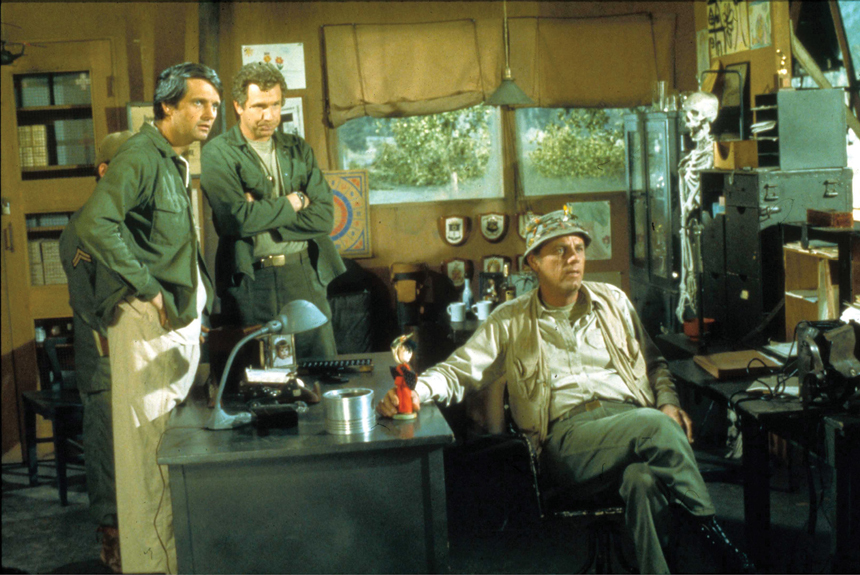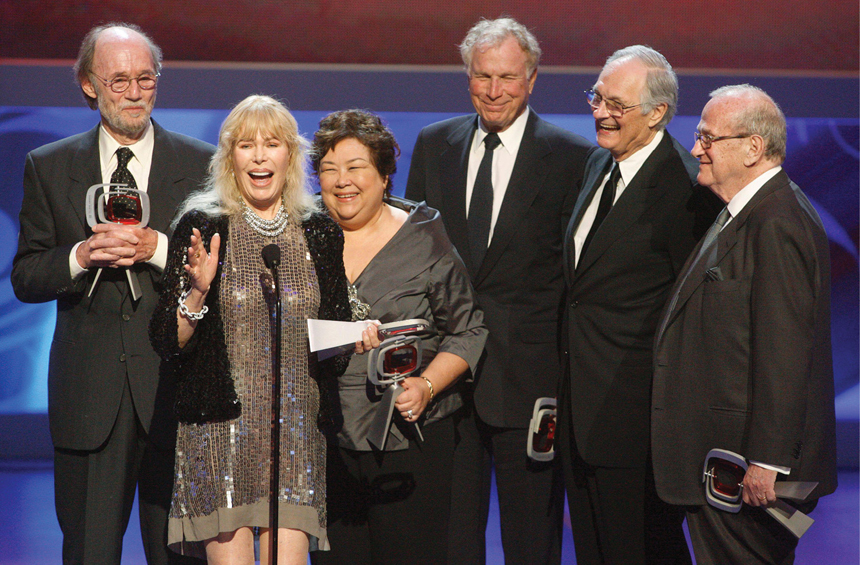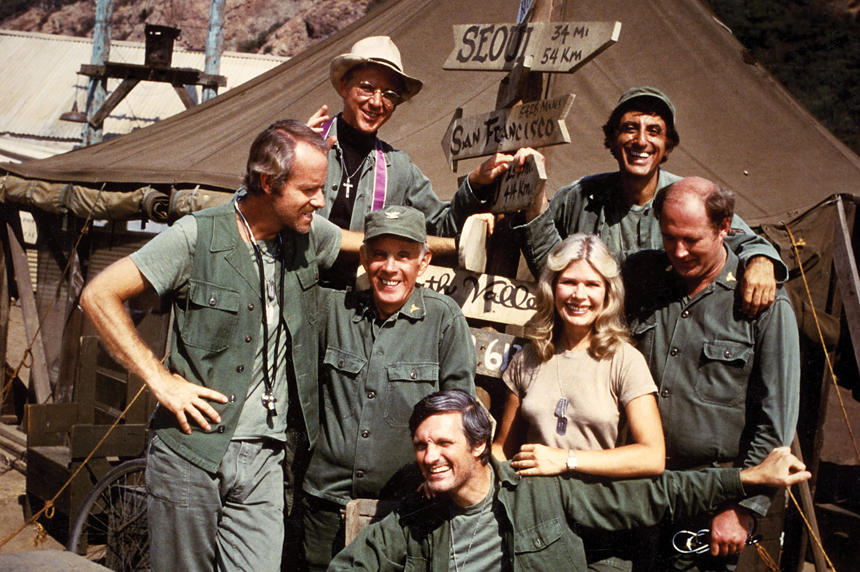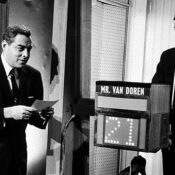The commercial and critical success of Robert Altman’s 1970 movie M*A*S*H made a TV series based on the film something of a pretested proposition. Fox assigned the show’s production to Gene Reynolds, a former child actor and television director who had recently transitioned into producing with his pathbreaking ABC show about an integrated Los Angeles high school, Room 222.
Thoughtful and meticulous, Reynolds made two critical decisions that allowed M*A*S*H to blend comedy and drama to greater effect than any television show before it (or, for that matter, almost any since). The first was in selecting a writer. Reynolds’s first choice was Ring Lardner Jr., a member of the formerly blacklisted Hollywood Ten, who wrote the movie’s screenplay. When Lardner passed on the project, Reynolds remembered an old friend, Larry Gelbart. At that point, Gelbart was not an obvious choice: He had not worked in American television or even lived in the U.S. for nearly a decade, but in the fraternity of television comedy writers, he was revered; Norman Lear, for one, considered him the wittiest of all.
Born in Chicago in 1928, Gelbart was a true prodigy: He was writing regularly for network radio programs while still in high school and was hired as a gag writer for Bob Hope before he turned 21. From Hope, Gelbart jumped to the legendary television writing staff for Sid Caesar, and after a relatively short stint there, he devoted much of the late 1950s to writing his play A Funny Thing Happened on the Way to the Forum, with songs by Stephen Sondheim. After Forum won the Tony in 1962 for Best Musical, Gelbart, burned out by the television business, moved to London to help supervise a 1963 production of the show there. He stayed the next nine years, keeping busy by writing and producing a show for the frantic British comedian Marty Feldman. But when Reynolds approached him with M*A*S*H, Gelbart was ready for something meatier. Familiar with the networks’ succession of antiseptic war comedies during the 1960s (Hogan’s Heroes, McHale’s Navy), he had only one concern: While America was still fighting in Vietnam, he didn’t want to work on a show that would “trivialize that effort by simply doing another gang comedy set in an army background.” Reynolds assured him he felt the same way.
The other key decision Reynolds made was casting Alan Alda as the show’s lead character, the charismatic surgeon Benjamin Franklin “Hawkeye” Pierce. Reynolds viewed Hawkeye as a tough balance: highly literate but impertinent. Alda, who had built a respected career in television, films, and the stage without achieving a true breakout role, offered just that combination of intelligence and irreverence. He initially expressed the same hesitation Gelbart had: With Vietnam still burning, he didn’t want to enlist in McHale’s Navy. Reynolds and Gelbart assured him that wasn’t their intent. Both men, in fact, on their most philosophical days, saw the show as something of an existential dilemma, albeit with a lot more jokes: Under grueling conditions, the mobile army surgical hospital’s doctors labored to repair wounded young soldiers so they could return to the fight and risk death or maiming again. The surgeons were Sisyphus with a scalpel. “What we wanted … was to do a show which fundamentally had as its subtext the wastefulness of war,” Reynolds said.
With this underpinning, the show’s contemporary echoes were impossible to miss, especially in its early years, while American troops remained in Vietnam. Gelbart, in fact, saw the show as a way for him to comment on the war after sitting out the protest movement of the 1960s while living in London, an interlude he called his hiatus of conscience. “I wasn’t very active in expressing my feelings about the war, except for the odd demonstration [by the American embassy] in Grosvenor Square, which hardly counts,” he later told sociologist Todd Gitlin. “I was drawn toward something that would let me get this sort of tardy … negative vote in.”

M*A*S*H was a relatively peaceful oasis. It debuted on September 17, 1972, only about seven weeks before Richard Nixon’s landslide reelection. After struggling its first year on Sunday night (when it was ground down between two shows that symbolized Nixon’s “silent majority” consensus, ABC’s The FBI and NBC’s Wonderful World of Disney), M*A*S*H thrived as soon as it was placed between All in the Family and Mary Tyler Moore on the brilliant 1973/74 CBS Saturday night. From the outset, the critical response mostly ranged between enthusiastic and reverential. Newsweek, in the most famous review, declared, “Without ever moralizing, M*A*S*H is the most moral entertainment on commercial television. It proposes craft against butchery, humor against despair, wit as a defense mechanism against the senseless enormity of the situation.” Critics quickly recognized and lauded the show as an evolutionary advance for the situation comedy.
CBS frustrated the cast and crew by hopscotching M*A*S*H across different nights, deploying it like a search-and-destroy missile against shows displaying strength on the other networks, but its ratings were stellar anywhere it landed.
Reynolds and Gelbart both believed deeply in research; they collected hundreds of interviews with veterans of the conflict and visited Korea after the second season. When Mike Farrell, who played surgeon B.J. Hunnicutt during the show’s final eight seasons, joined the cast, Reynolds and Gelbart presented him with a thick book of interviews from doctors, nurses, and soldiers who had served not only in Korea but also in Vietnam.
The cast remembers Gelbart as a genial presence who would bike down to the set from his office whenever they needed to untangle a knot in the script. Gelbart found a voice more urgent and contemporary than he had ever displayed before. When Reynolds offered him what he called the “soapbox” of M*A*S*H, Gelbart said, “that let me combine what was obviously a dormant letter to the editor writer with something that turned into a commercial success.” Gelbart was still brilliantly witty, but with M*A*S*H, he anchored that wit in a deeper recognition of life’s absurdities, indignities, and inescapable losses.
“A lot of those writers who came out of Sid Caesar and the Catskills comedians — they were not capable of doing anything but shtick,” said Linda Bloodworth-Thomason, who wrote or cowrote five M*A*S*H episodes. “Larry could immediately come up with the most hilarious line that you would want to write down. People talk about the Algonquin [Round Table and its witticisms]. Larry said 25 of those a day. I don’t care what you were talking about, he always had the best line. But … he was able to emerge so much beyond that.”
Key to that deepening was the intense connection between Gelbart and Alda. “They were into one another’s head completely,” Reynolds recalled. Together the two men created in Hawkeye an iconic, if idealized, character. Though Gelbart and Alda had each been born well before World War II, Hawkeye embodied everything the liberal baby boomers thought best about themselves: He was smart, humane, highly competent, and driven by a deep personal sense of morality even as he displayed witty contempt for mindless bureaucracy, outdated rules, and rigid social strictures. Through a show set in the 1950s, he appealingly combined the suspicion of authority that germinated in the 1960s with the sensitivity that the women’s movement increasingly demanded of men in the 1970s, especially as the show dialed back Hawkeye’s womanizing after the first few seasons. Hawkeye was never afraid to fight authority or to show his emotions. Yet he was the wizard whom all his colleagues looked to in the toughest cases, not Maj. Frank Burns, his by-the-book bunkmate committed to traditional conceptions of patriotism and masculinity (though the show loaded the dice so much that Frank’s efforts always ended in farce). Frank’s lover, Margaret “Hot Lips” Houlihan (the head nurse played by Loretta Swit), was another stickler for protocol, yet even she turned to Hawkeye, not Frank, at moments of crisis in the operating room. Hawkeye was freer and better, exactly what the liberal side of the baby boom considered itself to be.
Alda, the show’s undisputed center, set an inclusive tone. He was professional and grounded: During the show’s 11-year run, he flew home to New Jersey every weekend because he didn’t want to uproot his family. In a process that seemed more a natural progression than an expression of star prerogative, he expanded from acting to also writing and directing. “I always think of him as a very generous actor because he understood that while Hawkeye was the primary character in the show — which is why Wayne [Rogers] left, I’m sure — everybody really had to be developed, every character had to be given his shot, every character had to be full,” said Farrell, whose character essentially replaced Wayne Rogers’s Trapper John.
“He made sure that happened because it could have gone another way. It could have been ‘The Alan Alda Show,’ which in fact it was in a way. But it was far more the group, ‘The MASH,’ than ‘The Alan Alda Show.’”
Nor did the show have too many conflicts with the network. Gelbart said CBS didn’t challenge the lampooning of military authority or ask to dilute the unmistakable antiwar message. “The most radical thing we did, obviously, was that we did a show that was against war while this country was at war,” Gelbart reflected later. And as the show became more successful, any network objections diminished in direct proportion. “They were eating out of our hands,” Gelbart acknowledged.
Still, CBS sometimes recoiled at the show’s sharper edges. Reynolds and Gelbart were both determined to spike the comedy with stark reminders of the costs and futility of war. “We were always being urged by the network to keep it funny, … ‘Nobody’s really interested in that … sober stuff,’” Reynolds remembered being told. Gelbart said, “We always fought for the right to make the show not less funny, but more serious, even while perhaps becoming funnier.” Both men were determined to skitter along the tightrope between comedy and drama.

Their intention may have first become fully apparent during the 17th episode of the first season, titled “Sometimes You Hear the Bullet.” That one episode functioned as a microcosm of their ambitions for the overall series. It started with pure sitcom slapstick between Frank and Margaret, but it turned sharply when a childhood friend of Hawkeye’s, Tommy Gillis (played by James Callahan), appears in camp. He’s a journalist who has enlisted to fight so he can write a book about the war from the perspective of a soldier, not a correspondent. Gillis explains to Hawkeye that the book will puncture the myths about war sold in movies — among them, that doomed soldiers always hear the bullet that will kill them. He plans to title his book, You Never Hear the Bullet. Gillis goes back to the front, and Hawkeye returns to his usual pursuits, chasing a nurse and treating a suspiciously young soldier (played by Andy Griffith’s Ron Howard, billed as “Ronny”) recovering from an appendectomy. But Hawkeye is soon summoned back to the operating room, where a badly wounded Gillis is among the casualties. Gillis, his life fading, tells Hawkeye that in fact he did hear the bullet that hit him, and Hawkeye, growing anxious, tells him he can change the title of his book. Despite Hawkeye’s frantic exertions, his friend dies on the table, the first time an identified character dies in the operating room during the show.
Later, Hawkeye is in anguish when Henry Blake, the camp commander played by McLean Stevenson, finds him. “It’s the first time I’ve cried since I came to this lousy place,” Hawkeye says. “I’ve watched guys die almost every day. Why didn’t I cry for them?” Blake responds that in his command training, he learned that “there are certain rules about a war. And rule number one is ‘Young men die.’ And rule number two is ‘Doctors can’t change rule number one.’” Hawkeye realizes that he can save one life, and he outs Ron Howard’s underage soldier, sending him back home despite his protests. In the final scene, Hawkeye and Trapper steal a Purple Heart Frank has conspired to receive fraudulently and give it to Howard’s character so he’ll have evidence of the heroism he thinks will win him back his lapsed girlfriend at home.
The episode is a kaleidoscope of situation comedy conventions, unusually sophisticated emotion, and stark moral declaration. At the end, it was reasonable for viewers to ask whether what they had just seen was comedy, tragedy, or some mutable compound of both.
Gelbart executed his nuanced vision perhaps most powerfully in the final episode of the 1974/75 season, “Abyssinia, Henry.” When McLean Stevenson wanted off the show, Gelbart saw it as an opportunity to underline his core belief that M*A*S*H was, as he later put it, “not about happy endings.” Gelbart assigned writers Everett Greenbaum and Jim Fritzell (each of whose television credits extended back to Mister Peepers, in the early 1950s) to develop a script in which Stevenson’s Henry Blake was transferred home to much ribbing from the M*A*S*H staff. Then, in the final scene, came the twist: Radar appears in the operating room to announce that Henry’s plane has crashed in the Sea of Japan and that he is dead. Gelbart, who directed the episode, so wanted the news to be a surprise to the actors that he kept the final scene’s script from the cast until moments before they shot it. (The emotion survived a camera snafu that compelled them to shoot the scene twice.) Stevenson was so moved that he couldn’t leave his trailer during the season wrap party that followed the filming. Many viewers were shocked. On the night the episode aired, Reynolds, alone late in his office, answered the phone. On the other end was an irate viewer from New York City who had seen the East Coast feed of the show. She was outraged that Blake had died. “‘I don’t know why you did it,’” Reynolds recalled her insisting. “‘It was not necessary. It’s just a little comedy show. We sit and we laugh at the show. You did not have to do this.’” But it was precisely the ambition to create something more than “just a little comedy show” that had led Gelbart and Reynolds to kill off Henry Blake and to interject so many other darker moments into the show’s antic laughs.
Gelbart, who left the show after one more season, came to worry that M*A*S*H was normalizing war. Just by its longevity — the show would run 11 seasons, concluding in the Reagan administration — it seemed to suggest that with enough pluck and the right buddies, anything could be survived. It was a reasonable concern. M*A*S*H also dulled its political punch by positioning itself more against war in general than against any specific war: In M*A*S*H, the Korean conflict seemed less an expression of specific policy choices by individual political leaders than an expression of endemic human failures, more a natural disaster than a human-constructed catastrophe. And at times, its humor depended on the handy crutch of anachronism, with Alda, as the prototypical sensitive man from the 1970s, clashing with the unenlightened sensibilities of the 1950s.
But even with those limitations, M*A*S*H represented a transformative leap from the military comedies that preceded it. It was as funny as any show on television in that or any other era — Gelbart was one of the few television writers who truly deserved the title genius — but it never let audiences relax into the assumption that war was a laughing matter. It proved so consequential largely because it showed consequences that television had never before displayed.
Ronald Brownstein is a senior editor at The Atlantic and a senior political analyst for CNN. He is the author of six previous books, most recently The Second Civil War: How Extreme Partisanship Has Paralyzed Washington and Polarized America.
From the book Rock Me on the Water: 1974 — The Year Los Angeles Transformed Movies, Music, Television, and Politics by Ronald Brownstein. Copyright © 2021 by Ronald Brownstein. Reprinted by arrangement with Harper, an imprint of HarperCollins Publishers; Pictorial Press Ltd.
This article appears in the September/October 2022 issue of The Saturday Evening Post. Subscribe to the magazine for more art, inspiring stories, fiction, humor, and features from our archives.
Become a Saturday Evening Post member and enjoy unlimited access. Subscribe now




Comments
I always felt M*A*S^H was really more about Vietnam than Korea. but cleverly blurred the lines with parallels to both, making it ambiguous. It was a product of its time. 50 years later with endless wars this country has no business being in strictly for the profits of our broken government, Wall Street, and the military industrial complex with our own nation quickly going down the drain as a result, it’s hard to imagine mining any comic fodder for such a comedy ever again.
The article was great and told me a lot about why I loved M*A*S*H, but it didn’t address the one issue that kept me sad and depressed after I saw each episode. That is the fact that there was only one person of color as a regular on the show. There was a Black man in the opening credits racing for the helicopters, and I believe there might have been one Black soldier in one of the episodes, but the show challenged every facet of our culture but racism. I did appreciate it when Lt. Yamato asked Hawkeye why he never chased her. I don’t recall his answer bit it reminded me of the moment when Sojourner Truth asked the assembly of white women who were fighting for the vote, “Ain’t I a woman?” I never heard if anyone answered her but if they dared to speak the truth, I’m sure they said no.
My research turned up the following answer when I asked how many Black soldiers fought in the Korean War:
600,000 – According to 2 sources African Americans were able to now fight in the wars but they still faced many racial barriers, and the Korean war was one of the hardest wars for an African American soldier fighting for his country. Through all this adversity about 600,000 African Americans served in the armed forces during the war and 5,000 lost their life in combat… Military history of African Americans, Wikipedia.org
Many wars later, we’re still invisible in videos about returning veterans being welcomed or seeing their dogs for the first time in years. We’re not seen in sessions where veterans are fighting for their rights against the government that used them and threw them away when they returned home. Many whites argue that Blacks don’t belong here, that this isn’t our country, but we’ve fought in every war beginning with the American Revolution (… gaining freedom was the strongest motive for Black enslaved people who joined the Patriot or British armies. It is estimated that 20,000 African Americans joined the British cause, which promised freedom to enslaved people, as Black Loyalists. Around 9,000 African Americans became Black Patriots. As between 200,000 and 250,000 soldiers and militia served the American cause during the revolution in total, that would mean Black soldiers made up approximately four percent of the Patriots’ numbers. Of the 9,000 Black soldiers, 5,000 were combat dedicated troops. Notably, the average length of time in service for an African American soldier during the war was four and a half years (due to many serving for the whole eight-year duration), which was eight times longer than the average period for white soldiers. Meaning that while they were only four percent of the manpower base, they comprised around a quarter of the Patriots’ strength in terms of man-hours, though this includes supportive roles. – Wikipedia.org) As for the Civil War, 200,000 Black soldiers fought. It’s now being acknowledged that those men, most who left enslavement to fight, turned the tide when white soldiers died or deserted. Without them, the war would have been lost.
Viet Nam was the first war in which troops weren’t segregated. The citation for the number of Black men who fought is too long to cite here but the relevant information can be found here:
https://en.wikipedia.org/wiki/Military_history_of_African_Americans_in_the_Vietnam_War
It’s too late for us to be included in M*A*S*H but for anyone who writes about the show in the future, and those who write anything about the bravery of soldiers in combat protecting this country, I want this information to be included.